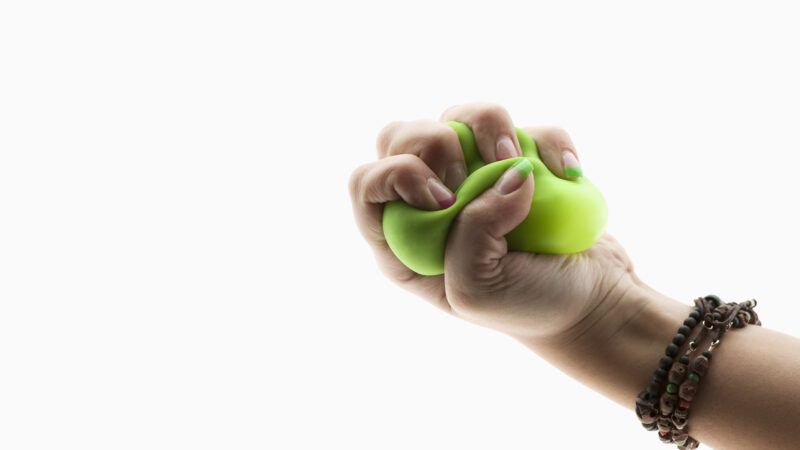Cops Thought Sand From Her Stress Ball Was Cocaine. She Spent Nearly 6 Months in Jail.
And now an appeals court has ruled the cops who arrested her aren't entitled to qualified immunity from her lawsuit.

Add stress balls to the list of innocuous items that have landed innocent citizens in jail due to shoddy police work and unreliable drug field tests.
The U.S. Court of Appeals for the 11th Circuit ruled last week that two Atlanta police officers are not entitled to qualified immunity from a civil lawsuit brought against them by Ju'zema Goldring for malicious prosecution. Goldring says the officers falsely accused her of jaywalking and cocaine trafficking, based on a field test of a powdery substance inside a stress ball she had in her purse.
Goldring spent nearly six months in the Fulton County jail because she couldn't afford bail and told local news outlet NBC 46 that she was occasionally put in solitary confinement. What's more, she was left in jail for four months after a crime lab concluded that the mysterious powder was sand, not cocaine.
According to the 11th Circuit's opinion, Atlanta police officers Vladimir Henry and Juan Restrepo stopped Goldring on October 10, 2015, for allegedly jaywalking. Goldring claims she wasn't jaywalking. In any case, the officers took Goldring to the police station and proceeded to cut open a stress ball they found in her purse and test the powdery substance inside using a Nark II field test for drugs.
As Reason reported earlier this year, such drug field test kits are manufactured by several different companies and are used by police departments and prison systems across the country. The test kits use instant color reactions to indicate the presence of certain compounds found in illegal drugs, but those same compounds are also found in dozens of known licit substances. And although the tests are fairly simple to use, they're still prone to user error and misinterpretation.
Last year in Georgia, for instance, a college football quarterback was arrested after bird poop on his car tested positive for cocaine. A Florida man was wrongfully jailed in 2017 after a field test confused his donut glaze with meth.
In 2016, sheriff's deputies in Monroe County, Georgia, arrested Macon resident Dasha Fincher after a search of her car turned up a plastic baggie of blue crystals. A NARK II field test of the substance returned a presumptive positive for methamphetamines, and Fincher was charged with trafficking and possession of meth with intent to distribute. Fincher sat in jail for three months until a state crime lab determined that the substance was blue cotton candy.
A follow-up investigation by a Georgia news station found that the NARK II test kit produced 145 false positives in Georgia in 2017.
And last year, more than a dozen Massachusetts attorneys said they were falsely accused of sending drugs to their incarcerated clients, who were then put in solitary confinement for receiving legitimate legal mail. (One way that synthetic opioids are smuggled into prison is by soaking papers in the drug.) A class-action lawsuit followed, challenging the Massachusetts Department of Corrections' use of Nark II field tests to detect contraband and punish incarcerated people.
However, Goldring and the Atlanta officers also dispute the results of the field tests. Goldring says Officer Henry "huffed and puffed" as he conducted multiple field tests on the powder, none of which changed color. Henry testified that he performed two field tests by simultaneously breaking the three glass ampules inside the test kit and shaking it. Both tests resulted in the liquid turning a "bluish-purple," which Henry and Restrepo interpreted as a "faint positive."
The 11th Circuit's opinion notes that the three glass ampules inside a Nark II test kit are supposed to be broken sequentially, not simultaneously, and that doing the latter would not result in a "meaningful finding." It also notes that only a "pink over blue" color change is considered a presumptive positive result.
Unsurprisingly, the results in Goldring's case didn't hold up under further testing. The Georgia Bureau of Investigations concluded on November 17, 2015, that the powder in Goldring's stress ball wasn't cocaine. However, the state didn't dismiss the charges against Goldring until March 21, 2016, during which time she remained incarcerated.
The 11th Circuit, affirming a lower court ruling, held that Henry and Restrepo are not entitled to qualified immunity from Goldring's lawsuit because there is a genuine factual dispute over whether Goldring was jaywalking and whether the field tests returned positive results.
But the lawsuit, like many of the court battles over these tests, sidesteps the fundamental issue, which is that police officers are over-relying on and misinterpreting these field tests to create probable cause to arrest people and jail them for months.
